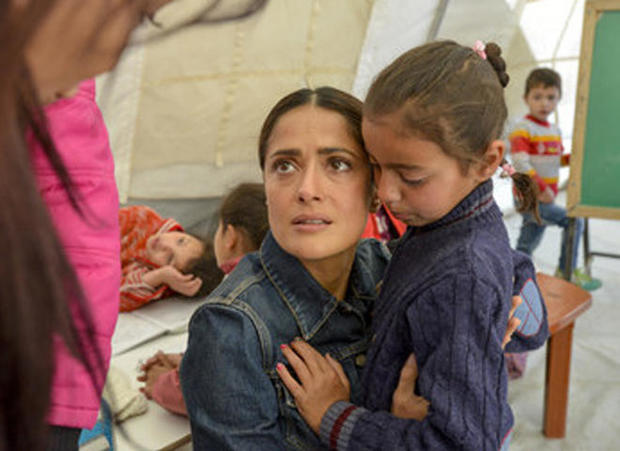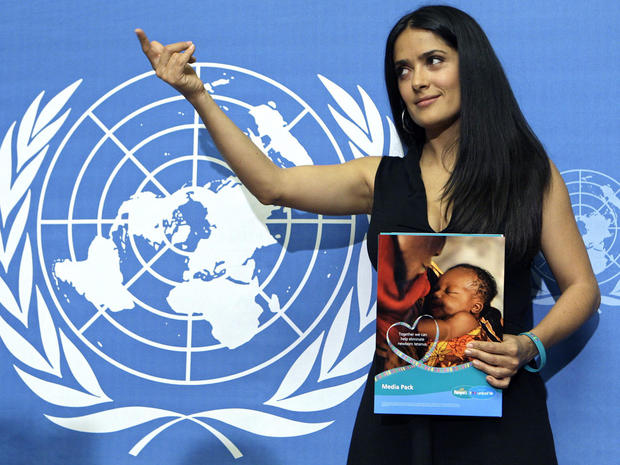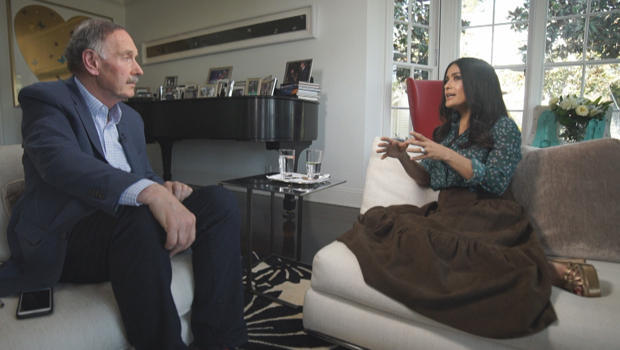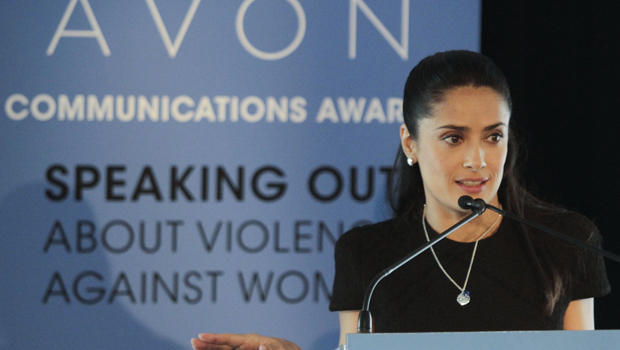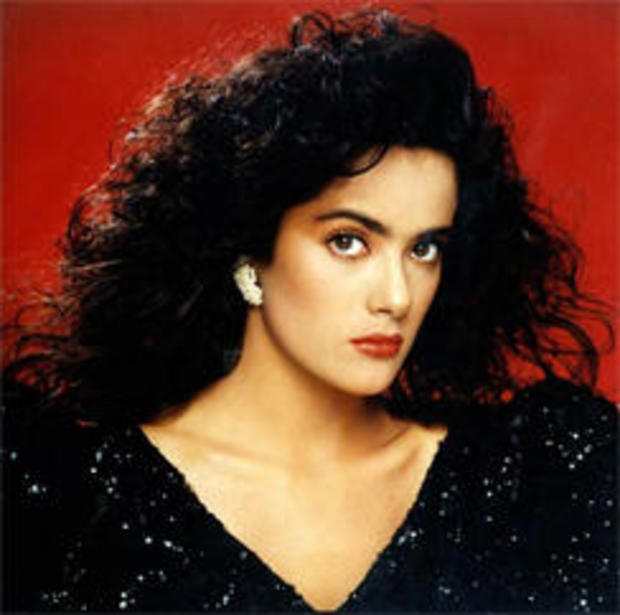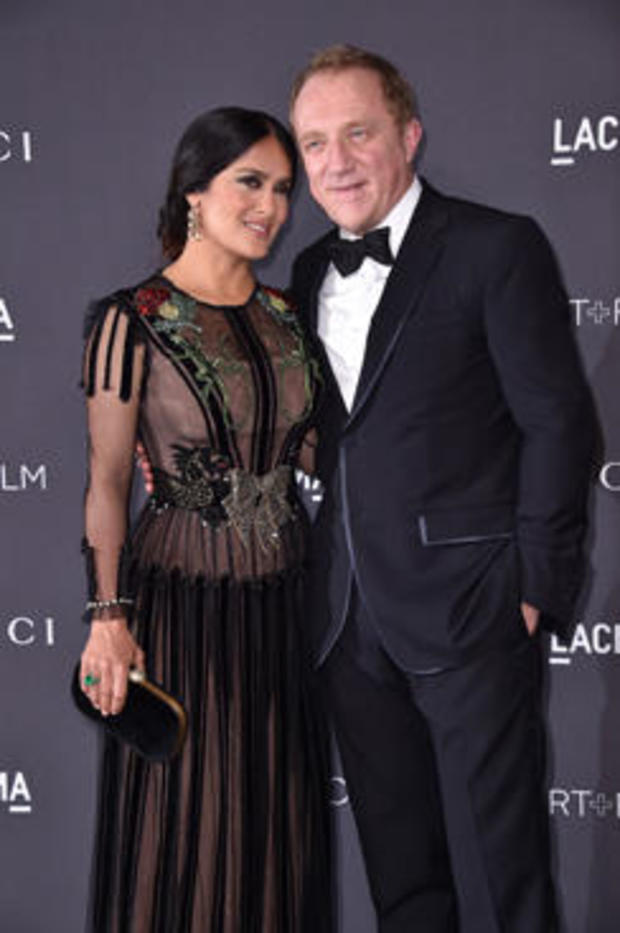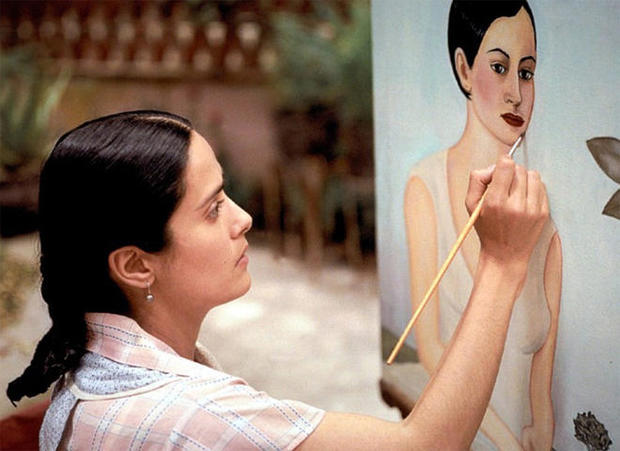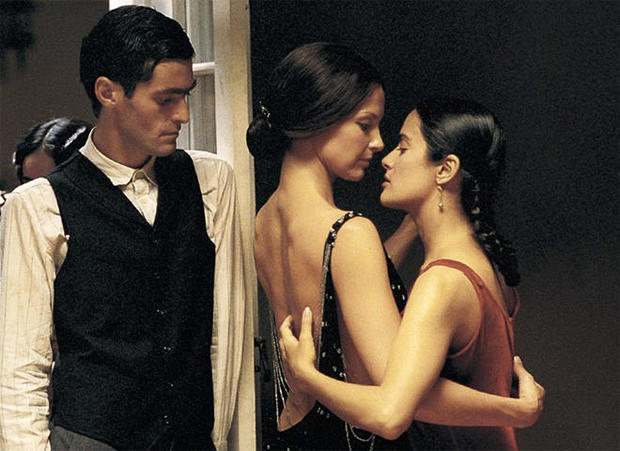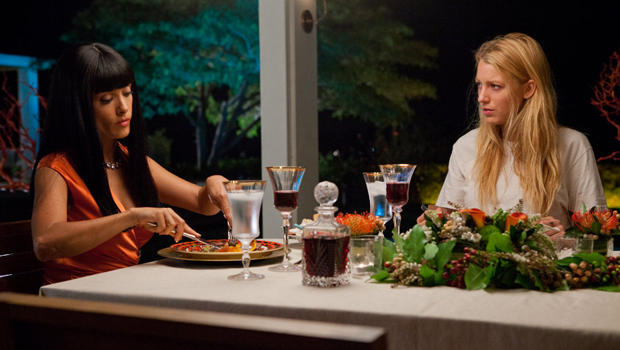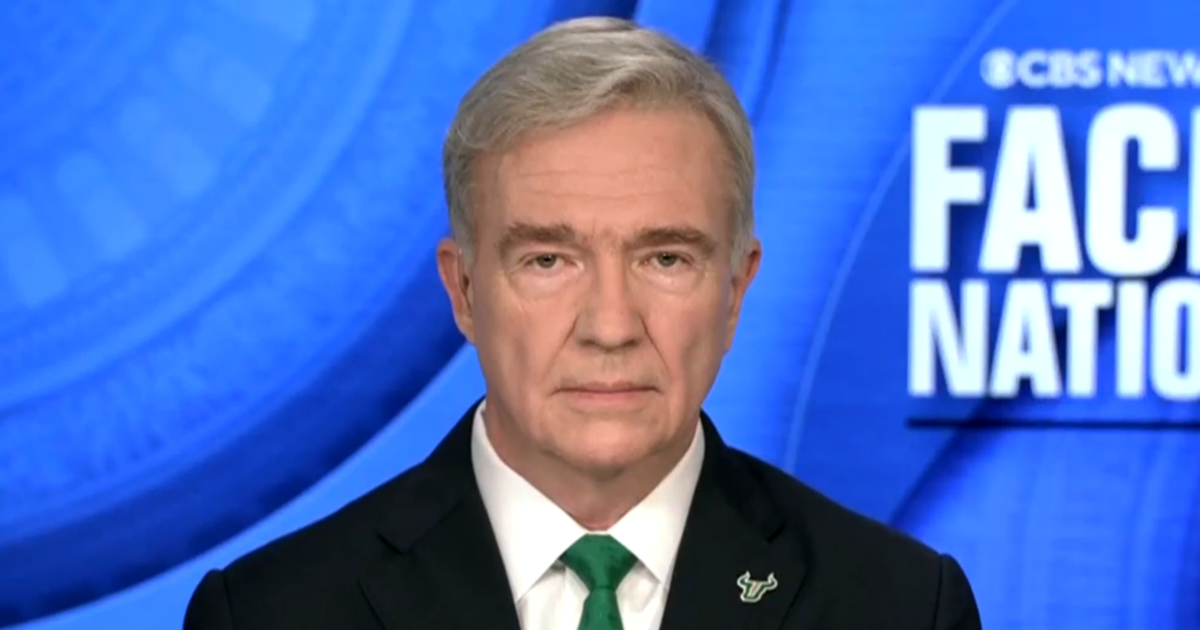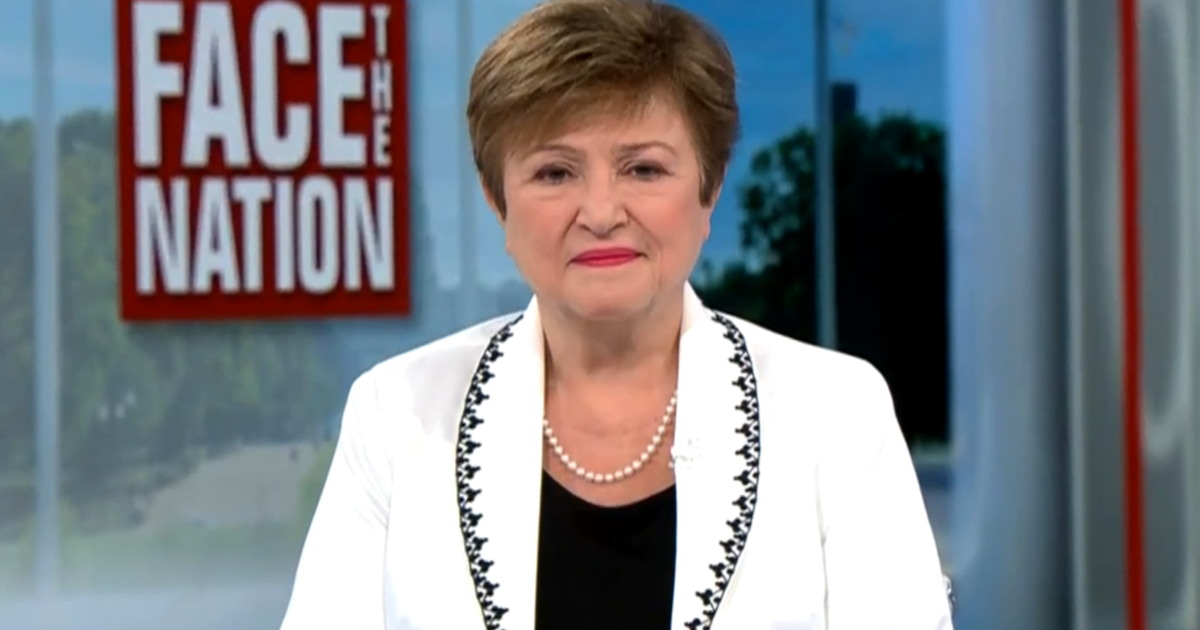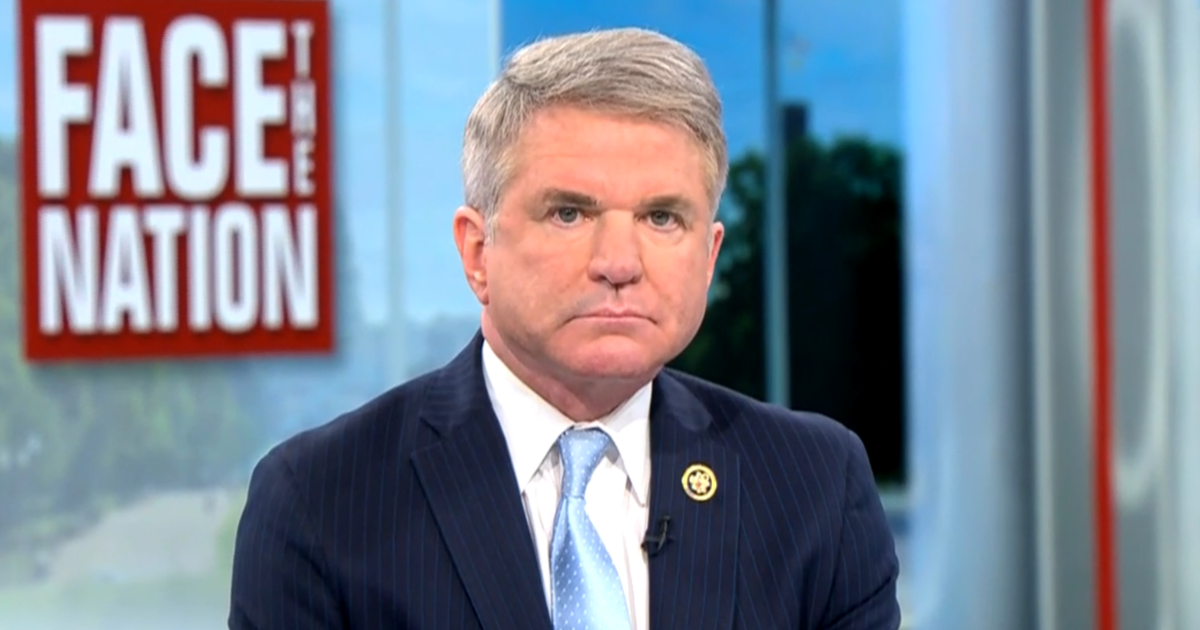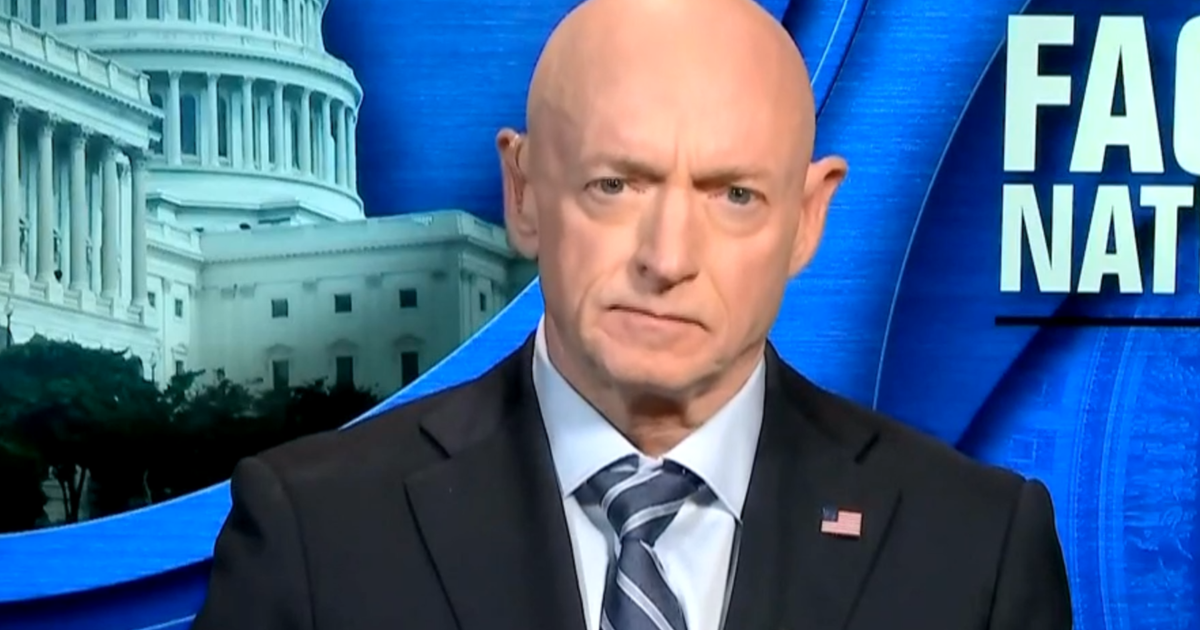Extended transcript: Salma Hayek Pinault
In this extended transcript of her interview with John Blackstone for "Sunday Morning," the Oscar-nominated actress and producer talks about her early dream of becoming president of Mexico; the importance of her charity work with UNICEF and other organizations; the #MeToo movement and the changing fortunes for women and Latinos in Hollywood; and her New York Times op-ed about Harvey Weinstein.
BLACKSTONE: You're a recipient of the UNICEF humanitarian award. How were you attracted to UNICEF in the first place? How did you earn this award?
HAYEK PINAULT: I've been working for UNICEF for more than a decade. I've worked with them individually. I have gone abroad with them. I've been in Africa with them. I've been in the Middle East with them. I even vaccinated in a campaign against tetanus.
BLACKSTONE: You gave needles.
HAYEK PINAULT: Of course. Yes. I also did a field trip with them to Lebanon with the Syrian refugee camps. So I've been working with them individually, and also through Chime For Change, which is an organization that I started with Beyoncé and Gucci. And most recently, because of my relationship with them, I asked them to help me help the Mexican people after the earthquake last September.
So it's a long-term relationship where we have done many, many, many projects in many different continents. Different scales. And I feel they have been a fantastic partner, and I'm very honored that they are recognizing our work together.
BLACKSTONE: And you've become a powerhouse fundraiser.
HAYEK PINAULT: Yeah, but most of my work is not fundraising. That is the thing I do the least. I don't do as much awareness on the fundraising as most of the other celebrities. I work on everyday basis on the strategy through two foundations.
One is the Kering Foundation. That is all work that is behind the scenes. And also with Chime For Change. And I also participate very strongly in something called Women In Motion that we started four years ago in the Cannes Film Festival to start talking about equality in the business. And now it's a very popular thing, but four years ago when we started in Cannes it was not very popular.
So most of the work that I do is office work, behind the cameras, it's strategy, and I've been very lucky, because I've done field work in India, in the Middle East, in Africa, in Europe, in America, in North America, Central America, South America. I've been around! And I've gotten to see the world from the very privileged to the least privileged. And I've been very lucky to have seen so much.
BLACKSTONE: And does that then help you decide how you're going to direct funds that come into the foundation? Is that the purpose of that?
HAYEK PINAULT: Yes.
BLACKSTONE: It's hard to give away money. I mean it's hard to decide who should get money, how it should be spent.
HAYEK PINAULT: Yeah, because so many people need it.
BLACKSTONE: Exactly.
HAYEK PINAULT: How should we spend? It's the best question. Because you have to figure out who you're gonna help the most with what you have. Because I've been doing this for 25 years, and I've worked with a lot of really good NGOs and organizations like UNICEF. I'm always curious. I try to learn from them. And yeah, it is hard to decide how can you help the most. Where. There are some problems that become very popular in different times. And then everybody gives to that, [whether] it was AIDS or cancer. When I started with domestic violence, nobody wanted to touch that. There was a huge stigma. And that's one of the reasons that made me very passionate to be an activist for that, because I saw the need in it and it was not popular. So it is finding who can you help the most, how can you help the best and through who can you be the most effective? Because you cannot do it alone. You have the find the right partner.
BLACKSTONE: And so when you go out on these trips, when you go to Syrian refugees in Lebanon, that's much more than a photo op when you go there?
HAYEK PINAULT: Of course. I don't work only with big NGOs. We are partners with different foundations. We are partners with UNICEF. But I had to go to see what are the operations, and what are the needs and what are the partners we can connect together, and what new ideas I can come up with or we can come up to together to help them. And how does that relate to some of the other problems that we are seeing in the world? And how collectively we can detect solutions. First, you have to detect the problems. What is the root of them? And how can you find out-of-the-box solutions for problems that keep repeating through generations.
BLACKSTONE: Have you had a success story that you can say, "Here's a way that we really made a difference in this place. It was a problem that, you know, repeated itself and repeated itself. And we did find an answer."
HAYEK PINAULT: Actually, yes. I have some really interesting success stories, although (LAUGHS) there's been many times where it's been absolutely devastating and you just don't see … most of the time it's, like, really hard to see the light. I will tell you a couple that are very different.
We did a program in Central America for AIDS where we worked with the prostitutes. It was a crazy idea, to train the prostitutes to educate men about using the condoms. Because they felt acknowledged as a possibility to have a contribution to society, they were the most passionate workers that you can possibly imagine.
It was so successful. It was a crazy experiment. It was so successful. A lot of these men didn't really even understand what was AIDS and how easy it was to contract it through sex, obviously. And especially in Nicaragua, the numbers dropped considerably through this program. And I had to go and meet the prostitutes and listen to the stories. And how is it evolving and where you getting the most rejection or the biggest obstacles. It was very, very interesting. Very interesting. And they really felt acknowledged.
BLACKSTONE: How did that come up? Were you sitting around one day saying --
HAYEK PINAULT: It was not my idea, but it's very interesting how they were really rooting for them to understand the most important thing in their life with the family. And how they had to be responsible and protect their wife and children. And it's the prostitute that the man are cheating with who are (LAUGHS) forcing it down on them to have this conversations. And they actually would listen to them! Except they were very drunk, and they have other techniques to use a condom without them even knowing that this was happening..
BLACKSTONE: It's a good story, though.
HAYEK PINAULT: But it was bizarre. And it really worked. It really worked. Then, I have another story that maybe it's one of the success stories. We have so many that make me feel very proud of a time in my life. Because I was invited to be the face of Avon, a long time ago. A long, long time ago. I was the first person they used. The first celebrity they offered this job, to be their face. And at the time I was young. Great skin. (LAUGHS) I could sell some makeup. And I had other opportunities maybe more glamorous, and I was very excited about Avon, because I think it's a fantastic company.
I remember when I was in Mexico a lot of the kids in my school were able to go to this private school because their mother was selling Avon. For me, in another generation, where women were not even allowed to go to school, in countries where it was not that popular or not even possible, a lot of women were able to be self-sufficient and help their family, support their children, especially single mothers. Through this community of women that would go door to door, face to face, women to women, and would just be girls and help each other out.
So I had a romantic idea about this company. Now, with all the internet things, don't work that way anymore. And I was already working with domestic violence, so I said, "I'd love to do it, but if you become my partner in the cause of domestic violence."
Now, they had a tradition and they have done amazing job for cancer, for breast cancer especially. And they said, "Well, we're very well identified with this cause for years. It's part of what we do." And I begged them and I said, "Please, let me at least just use your infrastructure. I'll give you part of my money so that we can do it. I just have a lot of plans."
And eventually I convinced them to work with domestic violence. And I'm very proud to say we did really, really, really good work. They have raised since then more than $100 million for domestic violence. We went to Congress and changed laws. We raised a lot of money. We raised a lot of awareness.
But the first idea I had, and this is a long time ago, was to use their brochures to give the number for the hotline so women didn't have to go look or research how could they get helped. But they had it. They were passing it on one to another, in this brochure where they would buy makeup and things for their house. And so that was huge.
The next thing, working with the hotline, is that I was able to make sure that they had people answering in Spanish and other languages seven days, 24/7. And this was incredibly successful.
BLACKSTONE: And it's important to have the success stories, because often the work can be frustrating as well.
HAYEK PINAULT: Yes, by the way, I stopped working with them as the [face], and I kept working with them as an activist.
BLACKSTONE: What has made you such an activist? Was it from your childhood? Did you grow up, your family helping others and saying this is something you must do. How did you become an activist?
HAYEK PINAULT: It's a very strange question for me, because everybody asks me these questions. And especially, like, "Why domestic violence? Do you come from domestic violence?" "No." "Did you experience it at home?" "Never." "Why do you do This? Why do you do that? Why are you an activist?"
And my head thinks, "Why don't you?" To me it's not how did you become an activist. I mean, you become an activist, but you have to not think about who you become and put a label in what you do. But more about what kind of a human being you want to be. Yes. And even most importantly, what kind of a world you wanna live in, and what's your participation in this dream? It's not just about I want the world to be like this. It's what's your contribution? Everybody can do a contribution. It's not about money. Even kindness can be a contribution to the world you want to be a part of. And so I am a dreamer. I want this world to be great. So I try to have my own contributions.
BLACKSTONE: So you've taken a business approach to activism in many ways, right? "How do we do this? How do we do this effectively?"
HAYEK PINAULT: Well, yes, you have to take business approach to a lot of things, because to be more effective as an activist, you have to have the right resources. Not always, huh? It depends what you do, because, for example, some of the people that have blown my mind were the people that were not dealing with the money. They were just in the field going from country to country, living in conditions you cannot imagine. Really well-educated people doing the work with their hands day by day. But they couldn't do it, we couldn't put them there, if you don't have the resources that they need to help the community that they're living in.
So it is important to be smart about how you get the money, where you send the money. There are ways to help people help themselves. And this is the best philosophy to help, because it's not just about them eating. It's about them standing up on the feet and being able to carry their families and their children. So this is for me the best way to help.
BLACKSTONE: One of the groups, that I think is another success story, is Mothers 2 Mothers. You worked in Africa with [them].
HAYEK PINAULT: That's a perfect example. Yeah, because Mothers 2 Mothers, it's an organization that trains women that are HIV-positive and have been pregnant, and live through the challenge of giving birth to a child and making them be HIV-negative, which is so much work, so many sacrifices.
And then they train them to help other mothers to make their kids healthy and be HIV-negative and survive, because even after they're born they can become HIV-positive, and they train them and they give them a job. And these women are amazing. I went to a lot the healthcare centers that were crying, bugging me, "Please help them out. You have to help them, because we couldn't survive without them. We couldn't exist without them." And last year they saved more than 700,000 babies from HIV. And they are only in eight countries. More than 700,000 babies just in one year.
And the most moving part about this, because I've heard so many stories, is women who thought about killing themselves because they thought they had no worth in the world. And life was just impossible for them to bear. They went from feeling like nothing to becoming heroes that save lives, that give love, that give support to other women.
The stigma stigma's still very, very bad. There's a girl that is so strong and she's so good. And when she disclosed her status to her family they made her live with the dogs and she has to eat with the dogs outside, as she was pregnant.
And now she runs one of the departments. She's a speaker. She's helped so many mothers. She's full of joy. Very confident. Her daughter is HIV-negative. And she's proud of her mother. And they have joy. She doesn't go around telling everyone the situation of her mom, but they couldn't tell by looking at her because she's just so healthy and full of life.
BLACKSTONE: You mentioned stigma. One of the stigmas that you combated in Sierra Leone was on breast feeding.
HAYEK PINAULT: Yes. I don't know if you want to talk about this, 'cause we got a lot of hate mail.
BLACKSTONE: All I read was praise!
HAYEK PINAULT: Ah, no, I got --
BLACKSTONE: You got a lotta praise as well.
HAYEK PINAULT: I got a lot of hate mail because of it. But I'm gonna talk about it. Women in Sierra Leone are vaccinating for tetanus. We go to places where there's no electricity, so these people cannot even get the medication because even if there's a little clinic, it has no electricity. So we come, you know, with a van, with a special refrigerator where we keep the medication. You gotta go really far away to the jungle. They go mouth to mouth. We have all the people so that we can immunize the young mothers so that also the babies don't get the tetanus through them. And so in one of these locations is this 15-year-old mother coming sobbing, "Do you have some milk?" "No, we're not carrying milk." "I need to get some milk. And I have no milk. I have no money. I have no food to give him. I have nothing. And nobody wants to give me milk and my baby's gonna die of hunger." And she was sobbing. And I said, "I've got milk," 'cause I had milked my child for the first time, and I was weaning her from breastfeeding. And I had milk. And I said, "I've got milk. Where's the baby?" "It's right here."
And so I just gave the baby the milk. I didn't think about it, because, like, if somebody's hungry and you're about to throw out a sandwich that is perfectly clean, why wouldn't you give it to the person that has not eaten in days if you're not gonna eat it? So I had the milk and I gave milk to the baby.
And so I'm talking to the journalist and I say, "You know, there's a problem in Africa because now the milk companies are convincing them that infant milk that they sell is better than the mother's milk." And it's very important in Africa that these kids are breast-fed because it's better for their immune system, the antibodies. You pass them through the milk. And I told her this. There was a lot of people that were upset I did that.
BLACKSTONE: But there were many as well who said you may have saved a life. Right?
HAYEK PINAULT: Thank God. (LAUGHS) Yeah.
BLACKSTONE: When you were growing up, could you have imagined the journey that you've been on or did you have a grand vision growing up?
HAYEK PINAULT: No. No. Not all. I would never have imagined. I mean, I always wanted to make myself useful, at least I knew I was not gonna be a parasite. (LAUGHS) This I knew. I always wanted to travel and help. But my entire life the way it is, I would have never in my wildest dreams imagine it was gonna end up like this. It's much better than my greatest dream.
BLACKSTONE: When did acting enter your mind?
HAYEK PINAULT: Acting enter my mind and then I was embarrassed to say I want to be an actor.
BLACKSTONE: You were embarrassed to say that?
HAYEK PINAULT: Yeah. I didn't have the courage, or to pursue it.
BLACKSTONE: At what age, teenager? Or younger?
HAYEK PINAULT: I graduated from high school at 15, and I got accepted to, like, one of the best universities in Mexico at that age. So it must have been, like, around that time, 14, 15, 16. But then my father made me wait until I was 16 to go to college because it was too young and he was afraid! (LAUGHS)
BLACKSTONE: He didn't want you to leave home.
HAYEK PINAULT: He didn't want me to go to Mexico City, go to college at 15. So I waited until I was 16 in September and then I was accepted for political science and international relations. I did really, really well. I was doin' that for two years, and I said, "Yes, I'm going to be a diplomat."
But my first love was always film. The interesting thing that I didn't realize until recently, it was not acting. I didn't even notice it. My dream was not, "Oh, I wanna be an actress like so-and-so." Through the years, I've realized maybe I wanted to be a director.
But already to think of being an actress was such an impossible dream. At that time in Mexico, you know, to think that I could direct movies here, it would have been even more outrageous. Even when I came here to say I wanna be a director, it would have been way more outrageous than to think I wanted to be an actress. But it's interesting. And I kind of blocked it.
BLACKSTONE: So when did you admit to your family --
HAYEK PINAULT: Yes, I was about 18, 19. And I took my father for lunch. Get good grades in school. Doing well. And I said, "You know, do you believe in destiny?" And he said, "Yes, of course." "Okay. I think it's my destiny to be an actress." And he's like, "What-- what-- what?" And it's like, "They keep calling me. They keep asking me to do commercials." That has nothing to do with acting, but "I tried to walk away from it, but it keeps calling me. It keeps calling me, 'cause it's my destiny." He's like, "I don't understand, what you're trying to say to me." I said, "I'm dropping out of college." And he went crazy. And he said, "No, you're gonna take an acting class on the side, (LAUGHS) and then you continue --" I said, "I've been doing that already, but it's just the college, it's really taking so much of my time. And I just can't continue."
And so my father accepts now that he thought, "She's so young. She'll take six months of classes, get it out of her system, she can go back to college. She really is too young, and maybe she's afraid." He said, "Okay, okay. We're gonna do the acting classes." And I never went back to college. (LAUGHS) And he's so proud of me. Nobody's more proud than him.
In reality I don't even think I wanted to be an actor. It was just my door in.
BLACKSTONE: You wanted to be the process --
HAYEK PINAULT: Behind. Yeah.
BLACKSTONE: How was your mother with your decision to leave college?
HAYEK PINAULT: She was okay. She didn't have a reaction as strong as my dad. And she probably thought that I was gonna probably get married (LAUGHS) or go back to college. She was very surprised also of how far it's taken me. I don't think at the moment they took it very seriously.
BLACKSTONE: So then an opportunity for Mexican television came along quickly?
HAYEK PINAULT: That happened way too quickly, and I rejected a couple of things. 'Cause remember, I have to study first. But that came quite fast and easy. And then I was insecure -- "I don't think I'm ready." And then finally I took a role in one, then another. And from there they gave me the lead role. And I auditioned with many, many, many girls. And Lucy Orozco, a Mexican producer, discovered me and she gave me the lead on a telenovela called "Teresa." About 60% of the people that were watching television were watching this show.
BLACKSTONE: Wow.
HAYEK PINAULT: In Mexico, that's a lot of people! And so success came really, really fast in Mexico. And then at the time they were not doing a lot of films in Mexico. Not any good ones, for sure. And so when I finished that, I went to theatre. But I suffered theatre, because I have stage fright.
BLACKSTONE: You have stage fright?
HAYEK PINAULT: Severe.
BLACKSTONE: Are you shy?
HAYEK PINAULT: Very bad. It's not shy. No, because you get, like, an anxiety attack. It's hard for me. It was not fun. Every night I thought it was gonna go away eventually. And once I'm on stage, there's a point where it's all good. But there were a couple of times in that period in Mexico, 'cause before the telenovela I did a children's play. They had to get me from the parking lot and drag me back to finish.
BLACKSTONE: Into the theatre?
HAYEK PINAULT: Into the theatre. I was Jasmine in "Aladdin." I was in shocked when I realized there was all that people looking at me. So the camera is okay, but when I see the audience, it's very hard, you cannot tell.
BLACKSTONE: Still?
HAYEK PINAULT: The process to make me look like I'm not suffering, it's complicated. (LAUGHS) So I didn't want to do theatre, and then I didn't wanna do the telenovelas anymore. So I came to the United States, knowing no one. My English was not as good as I thought it was, definitely.
And I went back to school. I am so old and so lucky that I got to study with Stella Adler in her last years. She was, like, '94. And I was in the Conservatory of Drama of Stella Adler. I was there for a couple of years. And then I started working as an extra, which was really bizarre for the Mexican audience, because I was a big star, and they didn't understand why I'm being an extra in America! But they got over it. Eventually they forgave me for it. (LAUGHS)
BLACKSTONE: How about you? Did you think, "Ah, I should go back to Mexico. I'm a star. I'll go back to Mexico"?
HAYEK PINAULT: My dream was not to be a star. My dream was to do movies. So an extra in a film, it's closer to my dream than a telenovela star. I had a clear understanding of what I loved. And I loved films. So I knew there was a very smart at the time. It seemed like there was no chance to succeed [in Mexico] 'cause it didn't exist, this possibility. I had to make peace with myself that I would prefer to fail in being true to myself and going after what I really wanted, than to succeed and settle in something I didn't want. So this was an important decision, and you have to really make peace with it, because I knew that the chances were almost none.
BLACKSTONE: Finally you were noticed. It happened.
HAYEK PINAULT: I got a break, and I thought, "Okay, it happened." And then there was no more break. (LAUGHS) And I got another break, and then, "Okay, now we're good." And then again, it was dry. So I say to myself, "I'm going to stop complaining about things. I don't have the right to complain about things that I didn't do anything to change. To make a difference."
So I'm complaining there are no roles for Latinos. Why don't I do anything about it? Right now I'm just whining. And so I created my production company. Now everybody has a production company; I mean, we are talking 26 years ago, 25 years ago.
It was hard, hard work. And I was not even developing things for myself, except for "Frida." I was doing it to make the difference, to make the change so that we could change a situation. We could change a perception. We could change a way of thinking. So that it would be laughable to think that because you're Latino you have no place in front of the camera unless you're an extra or a drug dealer, or a maid or a prostitute. And that took a long time. It took a lot of stamina.
And then I took a break and had the kids. And now my production company, Ventanarosa, I couldn't have imagined, we are developing five movies, four television shows, in development. Already sold. We're really, really thriving.
BLACKSTONE: Ventanarosa. What's that mean?
HAYEK PINAULT: Ventanarosa means pink widow. And when I was a little girl I was a dreamer always. And I would sit in front of a window in my house, which was kind of pink, and just look outside into the sky and dream for hours. Sometimes I would play. Sometimes I would just look out this window and come up with stories and come up with scenarios of what my life would be. I'd make myself cry on my own because of some story I am inventing. And look at the birds and the shapes of the clouds and the people passing by. And I would imagine the stories. It was my place where I would play with my imagination. And so I called my company "pink window."
BLACKSTONE: Back to your childhood home.
HAYEK PINAULT: Yes.
BLACKSTONE: You had become producer, business person. And that's more satisfying than being in front of the camera?-
HAYEK PINAULT: By the way, when I would start looking out that window, my dream was not to be an actress. My dream was to be the president of Mexico and change all the systems to help the people and make Mexico the best country in the world. This was my dream (LAUGHS) at five. Oh my God. Thank God I didn't go that way. (LAUGHS)
BLACKSTONE: So is the satisfaction that you get from producing and directing now much greater than being in front of the camera, than acting?
HAYEK PINAULT: Not necessarily. I enjoy it in different ways. I am not directing right now. I am mostly producing. I have a project that I want to direct, but I am so busy with the producing and with the family and the house and the husband that I think I'm gonna wait a little bit more to do that one, 'cause that one, once you get in it, it takes over. And it's hard with a family.
But I also really enjoy acting. I like the discipline of working every day, when you go in a movie. I like the discipline of looking into the foundation. What are we doing today? What are we doing tomorrow? Every day. I like to wake up every day and work. And go get my child.
And sometimes I wish I didn't work, and I would just, like, watch TV in bed. I have my days like that. Don't we all? But I think I would die if I didn't have that in my life. I like to be productive, creative, move, do things.
BLACKSTONE: You've married well. We know that you could hang around in bed all day if you wanted to.
HAYEK PINAULT: Or have lunches or go shopping. I'd die! I don't like shopping. (LAUGHS) I shouldn't be saying that. Shopping is great! (LAUGHS) But it's not my favorite thing.
BLACKSTONE: I read that you also want to pay your own bills.
HAYEK PINAULT: Oh, I pay my own. I pay my own bills. 'Cause I had my sanctuary for animals. I have my own things and I have also my cousins that I help separately, and all the things to do with my work. I would have no self-respect if somebody paid for me to have my production company. That would be a hobby or, like, some crazy spoiled brat's toy. I take it very seriously.
It just gives me a stability and, , I can understand parameters that way. Like, I don't wanna go into some land where I don't know where I'm standing or what's the value of things. Or I didn't earn my own money.
I know a lot of people, this is their dream; it's not mine. The best thing about having money is making money? It's a better thing to know how to make it, to know that you know how to do it on your own. Even if it's a little bit. Doesn't have to be a lot. There's a self-respect knowing you're doing that. You learn so much about life also. Through having to earn your rent. I think it's important for the psychological well-being of a human being. But that's just my own personality. But I don't judge somebody who doesn't wanna work. I don't.
BLACKSTONE: It certainly took determination to make "Frida."
HAYEK PINAULT: Yes.
BLACKSTONE: And that wasn't about money.
HAYEK PINAULT: It cost me a fortune. I didn't even have a fortune at the time. No, it's -- do you believe in destiny? Do you believe in destiny, John?
BLACKSTONE: I'm starting to. (LAUGHS)
HAYEK PINAULT: Something inside of me just knew I had to do that one. It talked to me in a different way. I mean, if I didn't have that, I would have given up. I just felt it was gonna be, like, really meaningful in some way. It was an obsession.
BLACKSTONE: So you had to work for eight years to get it off the ground.
HAYEK PINAULT: Yes. I actually maybe could have gotten it off the ground in different reincarnations before, even before Miramax, but I had a specific reason of the exact movie I wanted. And it would have never happened before [director] Julie Taymor. Other people had the propositions, but it wouldn't get made. It would have never been the "Frida" I was seeing, until Julie came along.
BLACKSTONE: A female director was necessary?
HAYEK PINAULT: That's an interesting question. That specific sensibility of these female directors was my vision, and everything I ever wanted for this movie. But maybe there was another female director that wouldn't have been able to do what Julie did. I think the fact that it's a woman gave a lot to it, but I'm not going to diminish her entire genius to just because she's a female. It's a lot more than that.
BLACKSTONE: But she had the vision.
HAYEK PINAULT: She had the vision. She understood the language. It was not about English. It was not about Spanish. Somebody who can express herself in an original way visually. And we needed a director that could do that with the film itself.
BLACKSTONE: For your op-ed piece in The New York Times, we learned how difficult, truly how difficult it was, to make that movie.
HAYEK PINAULT: You got a taste.
BLACKSTONE: Only a taste in that. (CHUCKLE)
HAYEK PINAULT: Cover of the book.
BLACKSTONE: Wow.
HAYEK PINAULT: But you know, it's out there. I did the film. And I said in the article (SIGHS), once it was done, I was not as involved in the post-production at all. I just needed kind of to distance myself. It was too long. I was exhausted.
I fell in bed for some time. I had used all my strength in getting it done. It's like, you're going up the mountain. Your legs cannot hold you any longer. Once you get up there, you collapse. So I just felt like whatever happens, it's okay now. I had this conviction. I had to do this movie. I did it. It's done. And it turned out that it did really well.
BLACKSTONE: Did very well. Of all the disturbing things that you told us in that op-ed piece, for me at least, was getting to that point when the movie's almost there, and then come these demands: $10 million and bigger names and get it rewritten. Where did you find the strength for that?
HAYEK PINAULT: Well, I knew it was a challenge that was given to me so that I would fail. I'm a rebel by nature. Sometimes I think that the fact that they told me, "You can never have a career in this country," or, "You will never do this film," kind of gives me a little bit, like, "Really? Well, let's see if this is the case. Let's go!"
"It's never been done." Ooof! [RUBS HANDS] If I hear those words, I get all the more excited. "It's never been done. It's impossible." All this music to my ears. I am so enamored with the concept of revolution, pushing the limits of human nature in a positive direction.
I am an optimist. I believe that we haven't seen the best of humanity yet. Any opportunity to change, to grow, to evolve gives me an extra strength, and then I am also very blessed. And one of the things that gave me the most inspiration was Ashley Judd, because I called her first and I was so embarrassed. I detest to ask for anything. I detest. You see, I pay my own bills. (LAUGHS) And I had to be humble and ask her the favor. And she was shooting. And I called her and I said, "Ashley, do you have a minute?"
"Actually not. I'm, like, shooting something. They're gonna call me any second. Well, what do you need?"
I said, "I wanna ask you for a favor."
"Okay, ask me."
And I'm like, "Remember my movie about the Mexican painter?"
"Yeah, yeah. Frido Kahlo. How can I forget? You didn't stop talking about it for years!"
And I said, "You know, I wanted to ask--"
"Oh, they're calling me now. Salma, the answer is yes."
I said, "But I didn't get to ask you."
"I don't care. Whatever you need, just tell me where to show up and when and I am there for you 100%. I have to go."
I said, "Should I send the script?"
"If you want to. I have to go." (LAUGHS)
"But I -- thank you so much, but there is no money."
"Listen, I have no time for this," and she hung up the phone!
And I was, like, sobbing. And my boyfriend at the time walked in and he said, "You cannot torture yourself so much with this movie. It's okay if you cannot do it. I worry for your health," because I went through, like, really bad depression throughout, because there was a lot of pressure on me. And it was hard. And I couldn't get out of the contract. I couldn't get out of the situation. But nobody knew, so they would just see me go up and down and they didn't know why I went down. You know?
And I said, "I am not crying 'cause I'm sad. I'm crying because I'm happy. I'm happy. I feel so blessed to have this kind of friends." And on top of it, very talented, beautiful, not only she was a big name and she was a good friend, but amazing actress. Amazing actress. So that's what started the whole, "Let's go. We can do this."
BLACKSTONE: You came to Hollywood to make a difference. Are things gonna be different for women in Hollywood now?
HAYEK PINAULT: I think things are already different for women in Hollywood. It was so fast. I mean it took a long time, but once it started, I cannot tell you, it's immense. You cannot even find female writers, 'cause they're all working. After never working, now they're all working.
It's now the trend. Like, the lead on a show that you're pitching has to be a woman. And this is why my company is doing so well. I've been trying to do this for so long, so a lot of the shows that I proposed years ago, somebody's come back to me and said, "Remember that show that you proposed? Can we do it now?" I was ahead of the time, and now we're getting to do a lot of things.
Also for the Latino community. it just started taking off, because stuff they heard a long time ago, but they liked but they wouldn't do it, and now it's the time. Especially for women, it's so exciting. It really is exciting.
I've never gotten so many offers in my life either, because things are coming out of the woodwork that had been waiting for this time.
BLACKSTONE: And reading your interview with Ashley Judd in Town and Country, reading that, it seemed to me that you were saying that the relationships between women in Hollywood had changed because of this, too. Is that true?
HAYEK PINAULT: I can't say, it depends how you see it, but I have to say that I always loved working with women, and I have a lot of great friends that have been my friends, who are actresses, who are in the business. Penelope [Cruz]'s my friend for I don't even -- she might be angry if I say how many years. (LAUGHS) It's gonna age us both. Ashley's been my friend forever. When I would go to set, I would be praying there would be other female roles.
When I did the movie "Savages," the best part of doing that movie was my relationship with Blake Lively. We are still friends. There was this idea, maybe this fear when I was coming here, that all the actresses are very glamorous and very competitive with each other. And I never had any of that. Amazing girls. Maybe because we understood how difficult it was.
But it is true that also when it comes in another level, for example, the executives, maybe they wanted to help, but their hands were tied or something because you didn't get extra support. There are aspects of it that has changed now, for the better. But I have to say, the camaraderie between the actresses, in my experience, I got to meet amazing women through this line of work.
HAYEK PINAULT: I think what I'm, like, super excited and proud about the Hollywood community is that at some point we came out, we say, "No more. This has been happening for a long time. It's happened to us." Women who are not from Hollywood immediately connected and understood they're not alone.
'Cause sometimes you can talk about it, you think, "There's something wrong with me. This happened to me." When you start talking about it, it's not just finding out how many more; it's getting together and saying, "No, this is not right," because men also have to listen and understand that it's not right.
There's some [men] that try to understand it, because for generations it's been accepted for so long. They thought it was okay to get away with it. I think that it's a beautiful time for a man, because it gives men an opportunity to redefine who they want to be without the fear and the pressure, also, that even the peer pressure of being like, "You have to be this way." "Hey, I get to be the best version of who I think I can be." So many beautiful things about men that maybe they never had the space in their mind, in their world, to explore about who they are, too.
And the most exciting part for me is that when the world saw all these women that are so visible, because it's Hollywood, coming together and say, "Hey guys, this is not okay, and we're gonna stop now. We have been through this, and now we decide that we're not the victims anymore. We take the power in the hands to say, 'This stops now.'"
I believe -- this is my theory, maybe I'm completely wrong -- what happened with the students in Florida, it's an immediate reaction to all these women, not just in Hollywood but how we've expanded, saying, "We're changing this now." And we did. It was okay to speak out and for the first time we came together. So these new generations found the courage to also speak out, because they had the hope that their voice would get bigger with many, many more.
I think a lot of people were afraid before and hopeless, saying, "What's the point? Nothing's gonna change." But they are seeing that there was a change with the women. Why not with the young people who fear for their life as they go to school? Maybe they thought, "This is the time where we can be heard." And they did come together. And it's happened many times before, unfortunately, but movement didn't start until now. So the ripple effect. Not only the change is happened, it has happened and it will continue, but I do think that women will start to feel a little bit safer in all walks of life.
BLACKSTONE: Certainly in Hollywood. Safer in Hollywood for women now.
HAYEK PINAULT: You think? (LAUGHS)
BLACKSTONE: Well, is it?
HAYEK PINAULT: I mean yeah, a bit. "Where should we meet to go over the script? It should be a public place." (LAUGHS) We just want peace and everybody to be taken into consideration with respect. Men and women.
For more info:
- Follow @SalmaHayek on Twitter and Instagram
- Charities and foundations supported by Salma Hayek
- UNICEF USA
- Chime for Change (Global Citizen)
- Kering Foundation
- mothers2mothers
- "Dinner at Beatriz" (Official site), available on Blu-ray/DVD and via streaming
